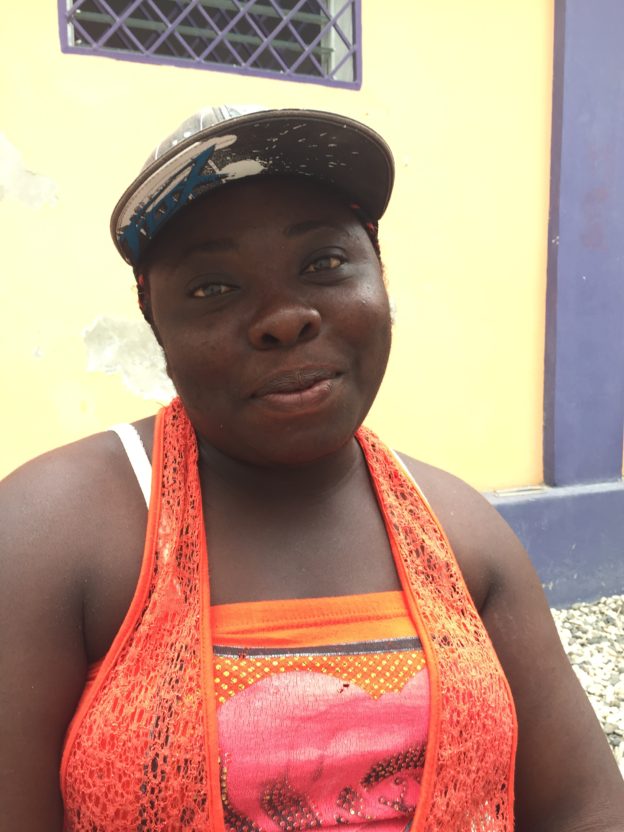Sonia is from Montay Terib, or Terrible Mountain, a mountainous area of Sodo, lodged between the fertile center of the commune and the coastal plain to the west. Though it is not especially far from large population centers in Kabarè, Sodo, and even Pòtoprens, it is nevertheless remote. There is no road to or through it that even a motorcycle – much less a car or truck – could travel. All transportation requires walking.
She joined the CLM program in 2011. At the time, she had three children, the youngest a nursing infant. “They took me into the program because I had nothing going on. I was living in misery.” Her family was regularly going hungry.
She chose goats and a pig as her two enterprises, and got to work. By the time she graduated in 2013, she had made a lot of progress. Not the spectacular progress that we sometimes see, but she had increased the value of her livestock by 50%, and her family was eating two meals each day.
She also had a plan. She wanted to continue to increase her livestock until she had enough so that she’d be able to sell some and buy a mule. A pack animal would help her establish commerce, buying agricultural goods around Montay Terib and bringing them to market in Kay Micho, Titayen, or Kabarè. Other graduates from Montay Terib entered Fonkoze’s credit program after they graduated, but she decided not to.
After graduation, things took a turn for the worse. The CLM program had not yet learned to establish veterinary technicians in the regions where it was working, and when the program left the area, her pig died. Then her goats were attacked by external parasites, and several of them died, too. And that wasn’t the worst of it. Her relationship with her husband began to deteriorate. “I think he wanted the house the CLM helped me make.”
So, in 2014 Sonia took two of her children – her eldest and her baby – and she left. The three moved to Kabarè, a market town north of Pòtoprens, along the coast. She had a sister there whom they could move in with. She got a job as a maid to keep her children fed.
But she soon saw that there was no future for her as a maid. She still had two small goats in Montay Terib, so she hiked up and sold them, hiking back down with the money from the sale. She began selling garlic, onions, and leeks in the Kabarè market. She liked being in business. She liked the bustle of the market. But she wasn’t making much money. She was just barely getting by.
So, she talked to her brother-in-law, and he explained a different business she might try. It is profitable, but also labor-intensive. Kabarè is an important selling point for produce destined for Pòtoprens, so there are markets three days a week. Every market day, she buys a 50-kilo sack of flour and brings it to a bakery, where they turn it into bread. Then she sits in the market, selling what they’ve made.
It’s a struggle. She explains, “I get no help from the kids’ dad. I am their food, and I am their clothes. I pay for school, and I pay our rent.”
But she is managing. She has about 4000 gourds in her business – a little over $60 – and in a week of work, she can earn enough to pay her basic household expenses and to make a 750-gourd contribution to her saving club.
And she has a new plan. “I have no place of my own in Kabarè. I have to rent, and it’s not good for me. I have to pay 3500 gourds or even 4000 every six months. I want to buy a home for me and my kids.”

After reading this, I’m wondering what the CLM program has done for her so I want to know what her self-esteem is like. Does she think she can make it, Steve? Or did the emphasis on planning leave her making plan after plan, none of which really work? I hate to see that happen. Her story underscores the importance of having those vets around who can help when the livestock fall ill. If one had been available, it could have changed everything for her. Also what about the Village Committee? Did she just “cave” and let her husband have the house or could she have gotten the help of the community to keep it for herself?
We continue to work on improving our approach to building the committees that provide the context for veterinary services. Perhaps more importantly, we are learning how important it is for case managers to work with whole families, not just with the woman, who remains our primary contact. Poor relations within a family turn out to be an important source of vulnerability for our graduates.
We are now experimenting with replacing one weekly home visit per month with a family conference. We’ll what it brings us.
Thanks for your comment.
For what it’s worth, Sonia seems optimistic about where she is, with a business model she believes in and friends and family in Kabare that she can talk to about what is going on in her life.